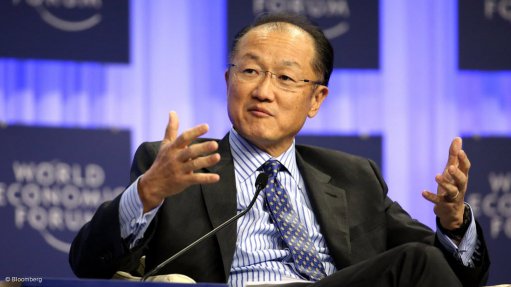
Jim Yong Kim
Photo by: Bloomberg
Weak growth among major emerging markets is expected to weigh on global growth in 2016, the World Bank said on Wednesday, noting that economic growth had slowed in most of the world’s largest emerging markets for a third consecutive year in 2015.
Global economic growth was less than expected in 2015, when falling commodity prices, flagging trade and capital flows and episodes of financial volatility sapped economic activity.
Marking the slower growth as a “worrisome development”, World Bank Group's development prospects group director Ayhan Kose described the slowdown as being unprecedented.
“We haven’t seen this many developing economies slowing down at the same time in the last 30 years, with the exception of the recent economic crisis,” he said.
Simultaneous weakness in most major emerging markets was also a concern for achieving the goals of poverty reduction and shared prosperity as those countries had been powerful contributors to global growth for the past decade.
Kose reiterated that these emerging economies had been mainstays of the global economic engine for years and that the current slowdown raised questions about growth in the years ahead.
Firmer growth would depend on continued momentum in high-income countries, the stabilisation of commodity prices and China's gradual transition towards a more consumption- and services-based growth model.
Further, spillovers from major emerging markets would also constrain growth in developing countries and pose a threat to hard-won gains in raising people out of poverty, the World Bank's January 2016 Global Economic Prospects report warned.
In its weakest economic showing for the region since 2009, economic activity in sub-Saharan Africa slowed to 3.4% in 2015, from 4.6% the previous year as a result of lower commodity prices, an economic slowdown in major trading partners, severe infrastructure constraints, political instability and electricity supply constraints.
The slowdown was most pronounced among oil exporters. Nigeria, the region’s largest economy, grew at 3.3% in 2015, down from 6.3% the previous year.
Gross domestic product in South Africa, a minerals and metals exporter, grew by 1.3%, down from 1.5% in 2014, as power supply problems, a severe drought, labour and social tensions and low business confidence weighed on growth.
Further, economic activity remained weak in some of the countries affected by the Ebola crisis, such as Guinea and Sierra Leone.
However, the report noted that global economic activity should pick up modestly to 2.9% this year, from 2.4% in 2015, as advanced economies gain speed.
Meanwhile, developing economies were forecast to see economic growth of 4.8% this year, lower than previously expected but up from 4.3% in 2015.
"There is greater divergence in performance among emerging economies. Compared to six months ago, risks have increased, particularly those associated with the possibility of a disorderly slowdown in a major emerging economy.
“A combination of fiscal and central bank policies can be helpful in mitigating these risks and supporting growth," World Bank Group VP and chief economist Kaushik Basu pointed out.
Although unlikely, a faster-than-expected slowdown in large emerging economies could also have global repercussions. Risks to the outlook also include financial stress around the US Federal Reserve tightening cycle and heightened geopolitical tensions.
"More than 40% of the world's poor live in the developing countries where growth slowed in 2015.
"Developing countries should focus on building resilience to a weaker economic environment and shielding the most vulnerable. The benefits from reforms to governance and business conditions are potentially large and could help offset the effects of slow growth in larger economies,” said World Bank Group president Jim Yong Kim.